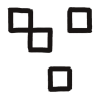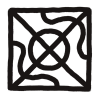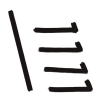Rose Choreographic School is an experimental research and pedagogy The theories and practices of learning project. We support a cohort The emphasis on a cohort learning approach values collaboration and the contamination of ideas as we all work through our research in relation to each other.
project. We support a cohort The emphasis on a cohort learning approach values collaboration and the contamination of ideas as we all work through our research in relation to each other. of 13 artists to explore their singular Denise Ferreria da Silva argues for singularity rather than individuality, as a means to articulate specificities within larger plural entanglements.
of 13 artists to explore their singular Denise Ferreria da Silva argues for singularity rather than individuality, as a means to articulate specificities within larger plural entanglements.  choreographic the choreographic can refer to choreography, and to the writing of dancing bodies, but it can also refer to modes of generating and circumscribing movement that do not register as dance, or as art works.
choreographic the choreographic can refer to choreography, and to the writing of dancing bodies, but it can also refer to modes of generating and circumscribing movement that do not register as dance, or as art works. enquiries and to collectively imagine a schoolGathering places for teaching and learning. Also, a school of thought is an idiom that suggests the sharing of traditions of philosophical and intellectual practices.
enquiries and to collectively imagine a schoolGathering places for teaching and learning. Also, a school of thought is an idiom that suggests the sharing of traditions of philosophical and intellectual practices.  through which knowledges and practices can be developed and shared. There is no set curriculum or syllabus, and no predetermined outcome; the focus is on coming together as a community of artist researchers to discover the conditions we need for speculation and articulation. Each cycle of the School lasts two years, during which we offer access to studio spaces, mentoring and a research budget. The Artistic Faculty There is a permanent Faculty consisting of the Head and Assistant ProducerThe Artistic Faculty will change with every two-year cycleWe will also invite visiting artists and make connections with the wider staff teams of Sadler’s WellsArtists in the School can also nominate their own mentors
through which knowledges and practices can be developed and shared. There is no set curriculum or syllabus, and no predetermined outcome; the focus is on coming together as a community of artist researchers to discover the conditions we need for speculation and articulation. Each cycle of the School lasts two years, during which we offer access to studio spaces, mentoring and a research budget. The Artistic Faculty There is a permanent Faculty consisting of the Head and Assistant ProducerThe Artistic Faculty will change with every two-year cycleWe will also invite visiting artists and make connections with the wider staff teams of Sadler’s WellsArtists in the School can also nominate their own mentors for this first cycle are Alesandra Seutin, Trajal Harrell and William Forsythe and they will invite engagement with their own research concerns and practices. Information about the first cohort The emphasis on a cohort learning approach values collaboration and the contamination of ideas as we all work through our research in relation to each other.
for this first cycle are Alesandra Seutin, Trajal Harrell and William Forsythe and they will invite engagement with their own research concerns and practices. Information about the first cohort The emphasis on a cohort learning approach values collaboration and the contamination of ideas as we all work through our research in relation to each other. is posted on the People page. We will open for recruitment for the next cycle in late Summer 2026.
is posted on the People page. We will open for recruitment for the next cycle in late Summer 2026.
The current cohort have collectively written a statement in solidarity with Palestine. It can be read in English or Arabic on our Publications page.
We propose a postdisciplinary This is a key term for us – linking our interest in educational practices that exceed academic disciplinary boundaries together with the critical rethinking of medium specificity and the notion of a dancerly discipline. approach to the question of the choreographic the choreographic can refer to choreography, and to the writing of dancing bodies, but it can also refer to modes of generating and circumscribing movement that do not register as dance, or as art works.
approach to the question of the choreographic the choreographic can refer to choreography, and to the writing of dancing bodies, but it can also refer to modes of generating and circumscribing movement that do not register as dance, or as art works. and engage with artists from all practices and inclinations for whom the concept of the choreographic the choreographic can refer to choreography, and to the writing of dancing bodies, but it can also refer to modes of generating and circumscribing movement that do not register as dance, or as art works.
and engage with artists from all practices and inclinations for whom the concept of the choreographic the choreographic can refer to choreography, and to the writing of dancing bodies, but it can also refer to modes of generating and circumscribing movement that do not register as dance, or as art works. is a central concern. Our podcast series a sharp prickled growth on flower stems, found on roses.
is a central concern. Our podcast series a sharp prickled growth on flower stems, found on roses. thornsa sharp prickled growth on flower stems, found on roses.
thornsa sharp prickled growth on flower stems, found on roses. , which can be found on our Publications page, invites a wider community of artists to speculate on pedagogy The theories and practices of learning
, which can be found on our Publications page, invites a wider community of artists to speculate on pedagogy The theories and practices of learning and the choreographic the choreographic can refer to choreography, and to the writing of dancing bodies, but it can also refer to modes of generating and circumscribing movement that do not register as dance, or as art works.
and the choreographic the choreographic can refer to choreography, and to the writing of dancing bodies, but it can also refer to modes of generating and circumscribing movement that do not register as dance, or as art works.
You can listen wherever you access your podcasts, or through this website, where we host a transcript and links to resources mentioned.
To find out more about future opportunities, events and publications, sign up to our newsletter here.
For more information visit the Glossary or Publications page where we expand on the ideas underpinning this project.
 project. We support a cohort
project. We support a cohort  of 13 artists to explore their singular
of 13 artists to explore their singular  choreographic
choreographic  enquiries and to collectively imagine a school
enquiries and to collectively imagine a school through which knowledges and practices can be developed and shared. There is no set curriculum or syllabus, and no predetermined outcome; the focus is on coming together as a community of artist researchers to discover the conditions we need for speculation and articulation. Each cycle of the School lasts two years, during which we offer access to studio spaces, mentoring and a research budget. The Artistic Faculty
through which knowledges and practices can be developed and shared. There is no set curriculum or syllabus, and no predetermined outcome; the focus is on coming together as a community of artist researchers to discover the conditions we need for speculation and articulation. Each cycle of the School lasts two years, during which we offer access to studio spaces, mentoring and a research budget. The Artistic Faculty  for this first cycle are Alesandra Seutin, Trajal Harrell and William Forsythe and they will invite engagement with their own research concerns and practices. Information about the first cohort
for this first cycle are Alesandra Seutin, Trajal Harrell and William Forsythe and they will invite engagement with their own research concerns and practices. Information about the first cohort  is posted on the People page. We will open for recruitment for the next cycle in late Summer 2026.
is posted on the People page. We will open for recruitment for the next cycle in late Summer 2026.  approach to the question of the choreographic
approach to the question of the choreographic  and engage with artists from all practices and inclinations for whom the concept of the choreographic
and engage with artists from all practices and inclinations for whom the concept of the choreographic  is a central concern. Our podcast series
is a central concern. Our podcast series  thorns
thorns , which can be found on our Publications page, invites a wider community of artists to speculate on pedagogy
, which can be found on our Publications page, invites a wider community of artists to speculate on pedagogy  and the choreographic
and the choreographic 